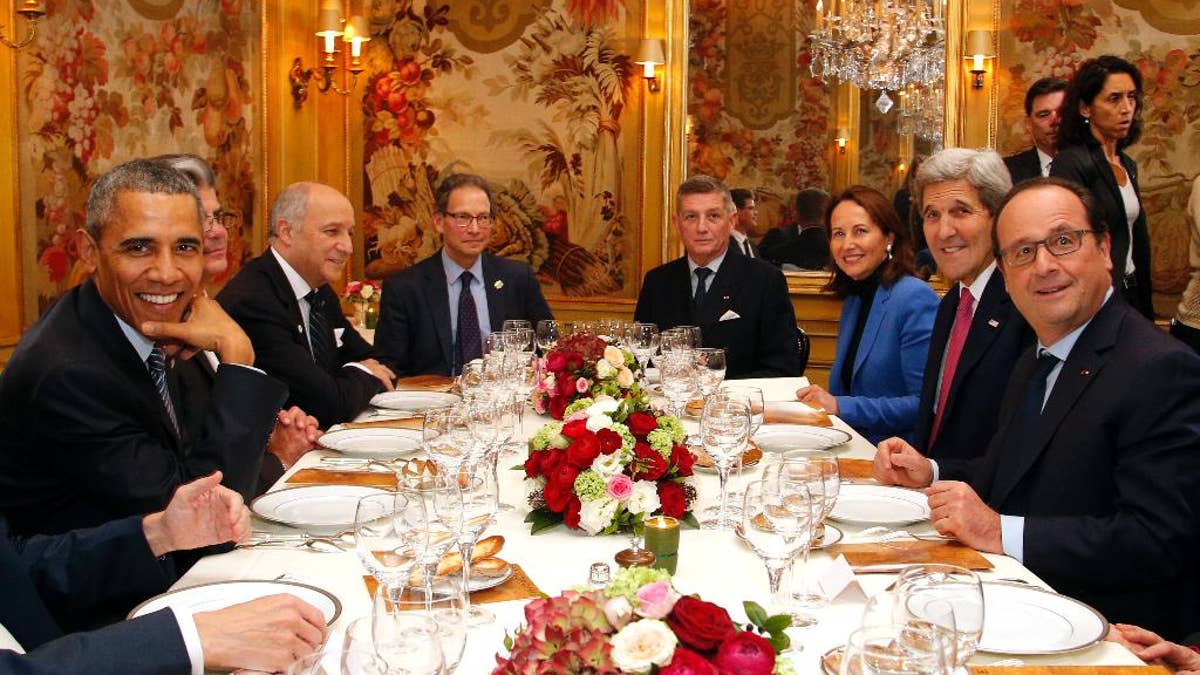
President Barack Obama, left, sits with French President Francois Hollande, right, as they have dinner at the Ambroisie restaurant in Paris, France, with Secretary of State John Kerry, 2nd right, French Minister for Ecology, Sustainable Development and Energy Segolene Royal, 3rd right, and French Foreign Minister, Laurent Fabius, 3rd left, Monday, Nov. 30, 2015. Obama is in France for a two-day visit as part of the COP21, the United Nations Climate Change conference. Other officials are : Translator, Thomas Ronkin, 2nd left, Charles Kupchan, top left, and French President Hollande's Military Chief of Staff General Benoit Puga, top right. (AP Photo/Thibault Camus, Pool) (The Associated Press)
President Obama is finally in Paris this week, but not to build a coalition to defend Western Civilization after the latest Islamist attacks there. Instead, he’s in the City of Light to join climate change aficionados in their latest confab, which he imagines to be an “act of defiance” and “rejection” of the jihadists he is unwilling to name. In reality, he’s there to partake of a faltering progressive religion.
So begins the “COP21,” or annual meeting of the Conference of Parties to U.N. framework on climate change. For the twenty-first time, diplomats and camp followers are gathering to bemoan the possible future effects of the four percent of Earth’s carbon cycle for which human activity is responsible.
Climate alarmist have long predicted doom from rising temperatures. Recently, they have added even more exotic claims. Democratic presidential hopeful Bernie Sanders asserted that, “climate change is directly related to the growth of terrorism.”
A Middlebury professor said that alleviating climate change was a reason to give amnesty to illegal immigrants.
The outcome of Paris is preordained. When 195 nations deploy an army of bureaucrats committed to more government control of the economy, they are going to reach a deal requiring more government control of the economy.
Poor talentless Prince Charles blamed climate change for the Syrian Civil War, and President Obama told Coast Guard cadets in May that the phenomenon was “an immediate risk to our national security.”
Perhaps the ISIS jihadists whose names we now know were plotting their own immediate risks at that time and didn’t like being outranked by a theory.
But what are the real effects of carbon from human activities? No one denies that the climate continues to change as it always has, but Earth stopped warming in 1998—an inconvenient truth for climate alarmists known as “the pause.” This stagnation occurred and continues even as predictive models incorrectly projected that temperatures and related damage were supposed to increase.
Also impeding the cause of climate alarmists were claims that data they used was intentionally falsified. Past predictions by radical environmentalists of doom and gloom have consistently turned out wrong: for example, Paul Ehrlich predicted in 1968 that 65 million Americans would starve in the 1980s.
Voters are slowing coming around. A poll released Monday showed that half of Americans recognize that scientists disagree about climate change. Only 47 percent think the government should do more about climate change; down from 70 percent eight years ago. While 63 percent of Americans think climate change is a serious problem, that figure has declined 6 points from just last year.
No matter: the outcome of Paris is preordained. When 195 nations deploy an army of bureaucrats committed to more government control of the economy, they are going to reach a deal requiring more government control of the economy.
Paris will likely lead to a pact that supposedly binds all nations to reduced carbon levels, although developing nations like China will be required to do much less to comply.
As usual, the burden will fall most heavily on the United States, in the form of higher energy costs and fewer jobs.
I can predict this because it is what I saw firsthand working on the issue at the State Department during the previous decade.
At the time, I was a speechwriter for the under secretary of state who had to explain to Europeans and others why the Kyoto Protocol, which sought to regulate America while ignoring massive carbon emitters like China and Brazil, was a non-starter for President Bush and Congress.
Not only was there the matter of the disputed science; it also seemed unwise to waylay the American economy that had produced so many energy-related innovations for the world—and which today is showing the way to a less-carbon-intensive future through the natural gas renaissance and other advances.
It was then that I realized rational arguments do not work against climate alarmists. Shortly before, the author and screenwriter Michael Crichton put his finger on why, noting that:
“Today, one of the most powerful religions in the Western World is environmentalism… the religion of choice for urban atheists… If you look carefully, you see that environmentalism is in fact a perfect 21st century remapping of traditional Judeo-Christian beliefs and myths.”
In other words, we’re not dealing with a disagreement over public policy, but with a theology—an article of faith and emotion. No quantity of facts will ever change the views of climate alarmists; the best we can do is get others to disagree with them.
Crichton’s view was that religion can’t be removed from the psyche of man. The quest for meaning in life and belief in something greater is hardwired into our minds.
The secularists among our liberal elite, and especially in European nations, have pushed out the God of the world’s great religions and unwittingly replaced Him with another.
In a way, they’ve brought mankind full circle. One of the most common convictions of primitive man across many cultures was a belief in a sun god—a pagan deity whose good graces were essential to the climate and survival of humanity. In our own hemisphere, the Aztecs went so far as to sacrifice humans to keep him happy.
Today, the climate alarmists, including President Obama, aren’t interested in offering up humans to assuage an angry deity. They merely want to sacrifice our economy.
